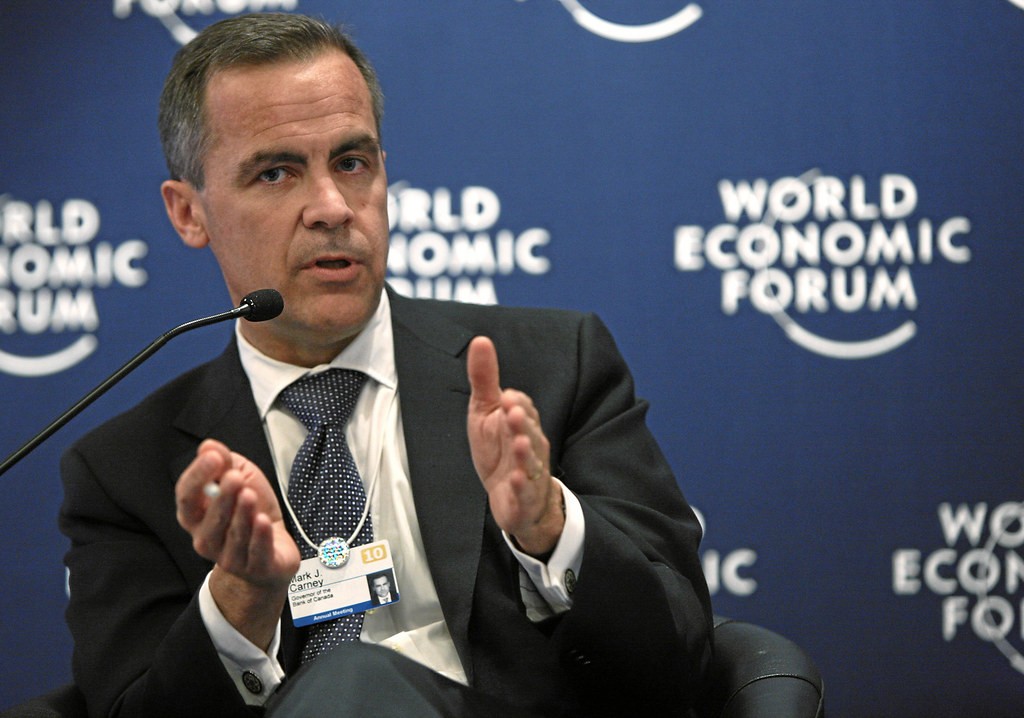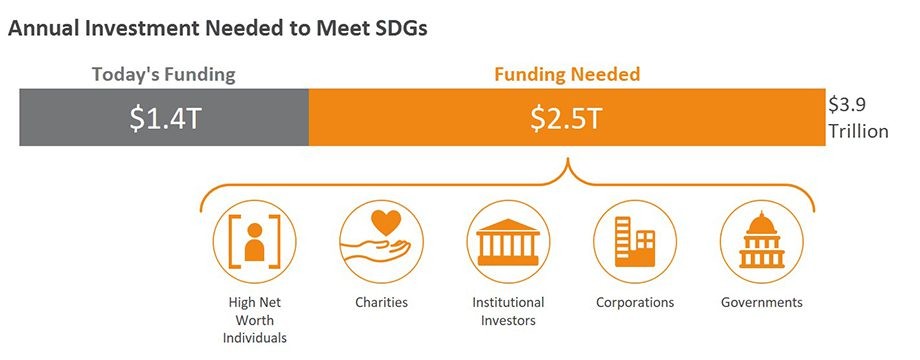Our world faces a wide range of issues such as climate change, water shortages, loss of biodiversity, pandemics, global forced migration, destruction by conflicts and war, poverty, and social inequality. Many of these are not limited to the global south or north; they're hitting us all. Wealthy or poor; they affect us indiscriminately.
Collective funding solves problems
United Nations Member States have come up with a shared blueprint for a better world and a healthy planet. Where peace, dignity, and prosperity are not privileges—but universal rights. The blueprint urges action for a global partnership from all countries. The United Nations estimates a need for $3.9 trillion a year between now and 2030 to meet the Sustainable Development Goals (SDGs). To make this happen, we will need action from all industries, from philanthropy to government funding. Combined with other industries, philanthropy alone is not enough to help fill the additional $2.5 trillion. We will also need help from private investors and the state.
Why we need to ask questions
United Nations special envoy on climate action and finance, Mark Carney, has a message to those wanting to be involved in climate action: ‘We all have a role in this adjustment. One of the most basic roles is asking questions.’
Let’s take this advice to heart and ask questions about our basic roles and rights when facing global challenges. This means holding institutes, governments, and corporations responsible for their decisions and actions. We have the right to ask about their work through civil tools and channels.
This way, our impact is constructive, especially when living in a democracy. If we are lucky enough to have power; and are part of institutes, governments, and corporations, we are expected to ask the right questions, be accountable, and stay mindful of our decisions.
- As philanthropists, whether working in a charity, or (thinking of) supporting one, there are some questions to answer, to check we’re being effective:
- How and through what channels are we holding ourselves accountable?
- How is our current focus and approach connected to the interests of current and future generations? How can we be more effective?
- What are powerful roles we can play to have greater impact now and in the future?
- What specific area that we support that will have the greatest influence?
- And, which of our daily choices and actions can play a part in changing the status of the global crisis we are witnessing now?
At Kinder, we’re attempting to respond to these questions. We believe in knowledge as an engine. This engine empowers the charitable sector to be more impactful, while helping philanthropists make intelligent giving decisions. This is how true power— from both charities and donors — merge to bring real positive change. We see knowledge, power, and trust as the key interconnected elements in doing good, better.

Philanthropy is changing, and so should we
Philanthropy has been around for millennia, rooted in different religions, traditions, and cultures. It’s driven by empathic human nature. It’s evolved to reduce burden from individuals, communities, and societies. However, burdens have evolved; broadening in their scope — and in the diversity of their concerns.
The practice of philanthropy must evolve in step. As we work towards the United Nations Sustainable Development Goals 2030, philanthropy has become more focused on specific issues, and philanthropists have been encouraged to think and act globally— rather than locally.
Using knowledge and tech to do good better
In recent decades, we’ve seen the rise of mega-donors who have decided to use (part of) their wealth to do good in the world. If you’re a donor, business, or investor wanting to help— we can offer you the knowledge-based channels to funnel good intentions into effective action. The partnership between Rabobank and Kinder is a good example of how we can support your philanthropic giving.
Raising global awareness while using innovative technology can empower inclusiveness. When technology provides seamless access to information for all, it can nourish a sense of responsibility. It can empower an urge for involvement, and a quest for change that can only be achieved when approached by many. Inclusiveness can democratise giving; so there’s more power in the hands of donors, who can unite around the same causes. The hope is that as technology evolves, it will allow for mass collaboration, aggregated funds, and more powerful unification for doing good.
The next generation of digital natives are taking the reins. They’re moving into powerful positions and have the potential to make effective contributions. There is also a shift towards the measurable and sustainable impact of philanthropic giving. Donors are more skeptical about trusting the charitable sector, wondering if their money is being put to use effectively and efficiently.
Donors focusing on knowledge are demanding clear key performance indicators (KPIs). In this new “era of impact”, we can see a convergence of traditional charities and philanthropists, businesses and investors, as well as policy-makers. They collectively strive towards impact inspired by a sense of urgency, higher purpose, and social value creation. By working together, they are far more effective.
We believe that every institution involved in philanthropy needs to be equipped with knowledge, information-driven technologies, and innovative tools to work together effectively. This is how Power, Knowledge, and Trust will evolve philanthropy over the next decade to bring positive impact.

Why trust is so important in philanthropy
We view the next decade as a time of informative, transparent, and democratic philanthropy. Only approaches that foster trust will survive. The three-year downward trend of charitable donations between 2016 and 2018, as identified by The Charities Aid Foundation after a period of scandal-dominated headlines, shows how quickly people can lose trust if charities fail – or appear to fail in assuring the public.
According to Rui Domingues, director of finance and operations at the Charity Finance Group (CFG), “People want to know that their donation not only reaches where it was intended, but that it’s having an impact. And people want to see charities holding the high ethical and moral standards that are expected from the sector.”
Digital technologies will accelerate the changes needed for donors to follow their money, and link results to their donations. If we want philanthropy and social investing to have impact today, we must make data widely available; elevate transparency, and create effective feedback loops. This can be done when organisations are intentional in their process — by listening to what their beneficiaries have to say, learning from their internal and external monitoring and evaluations, and by working through the feedback they collect. By incorporating this data into their operations and activities their work is much more likely to have impact.
If we succeed in all these things, we will enhance trust. Sharing knowledge for everyone's benefit, and harnessing new media and technology to spread it more effectively, will have an enormous impact on philanthropy.
Our Kinder call for united action
Kinder is determined to increase trust by empowering both charitable organisations and donors with knowledge. It connects both sides and gives them power that is embedded in data, feedback loops and technology.
Eight centuries ago, Persian poet Saadi wrote a poem that now adorns the entrance of the United Nations building. It says: ‘ human beings are members of a whole, in creation of one essence and soul, if one member is afflicted with pain, other members uneasy will remain, if you have no sympathy for human pain, the name of human you cannot retain. ’
Encouraging united action is our way to democratise giving to causes. If we don’t work together, we’ll feel the pain of not addressing them sooner or later.
Image credit from The Bridgespan Group





